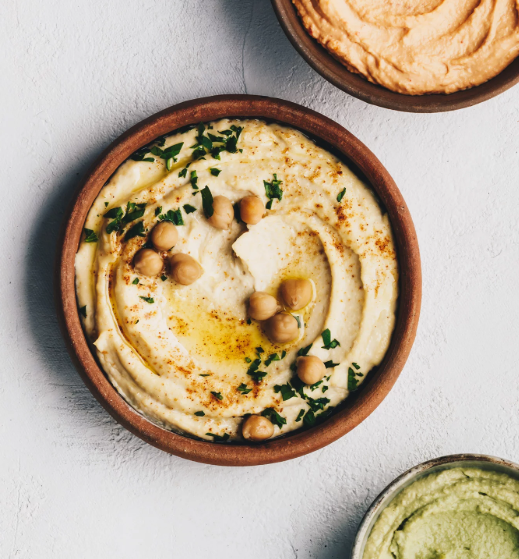
Can Hummus Help You Lose Weight? A Nutritionist’s Perspective
Hummus, a creamy dip that has gained global popularity, is not just delicious—it can be a helpful ally in your weight loss journey when consumed in moderation. Packed with plant-based protein, fiber, and healthy fats, hummus helps keep you full and curb cravings. If you’re looking to shed a few pounds, this nutrient-dense snack may just be the perfect addition to your diet, but it’s important to use it wisely.
In this blog, we’ll explore the nutritional benefits of hummus, how it supports weight loss, and tips on how to incorporate it into your meals without overindulging. Let’s dive into whether hummus can truly help with your weight loss goals.
What is Hummus?
Hummus is a smooth dip or spread that has its roots in the Middle Eastern and Mediterranean regions. While the exact origin is debated, it’s widely believed to have been enjoyed by ancient civilizations such as the Egyptians, Arabs, and Greeks. Traditionally, it’s made with simple ingredients like chickpeas (garbanzo beans), tahini (sesame seed paste), olive oil, garlic, and lemon juice, all of which are packed with nutritional benefits.
Key Ingredients of Hummus
-
Chickpeas: The base of hummus, chickpeas are loaded with plant-based protein and fiber. They also provide essential vitamins and minerals, including folate, iron, and magnesium.
-
Tahini: This sesame paste adds creaminess to hummus and is a great source of healthy unsaturated fats, which benefit heart health.
-
Olive Oil: A core ingredient in Mediterranean diets, olive oil is rich in monounsaturated fats that reduce inflammation and promote heart health.
-
Garlic: Not only does garlic enhance flavor, but it also contains compounds that help lower cholesterol and improve cardiovascular health.
-
Lemon Juice: A refreshing addition, lemon juice offers a tangy flavor and is rich in vitamin C, supporting your immune system.
Nutritional Benefits of Hummus for Weight Loss
Hummus has a balanced macronutrient profile, making it a great option for weight loss. Here’s how its nutrients can support your weight management goals:
-
High in Protein
Protein is essential for anyone trying to lose weight, as it helps manage hunger and maintain muscle mass while in a calorie deficit. A serving of hummus (about 2 tablespoons) provides 2 grams of protein from chickpeas. Protein helps increase feelings of fullness, which can reduce the likelihood of overeating. Moreover, consuming adequate protein during weight loss helps prevent muscle breakdown, making hummus a great snack for muscle retention. -
Rich in Fiber
Hummus is also an excellent source of fiber, with 1.5–2 grams per serving. Fiber slows digestion, which leads to prolonged feelings of fullness. This can help you maintain a calorie deficit without feeling deprived. Fiber also supports digestive health and can alleviate bloating, a common issue during dietary changes. -
Healthy Fats
The fats in hummus primarily come from tahini and olive oil, both of which are heart-healthy unsaturated fats. These fats play a key role in reducing the risk of chronic conditions like heart disease. Healthy fats also help reduce unhealthy snacking. Since fats take longer to digest, they keep you satisfied for longer, reducing the temptation to reach for high-calorie, processed foods. -
Low Glycemic Index
Hummus has a low glycemic index (GI), meaning it doesn’t cause the rapid spikes in blood sugar that can lead to cravings and energy crashes. Foods with a low GI digest slowly, helping to stabilize blood sugar levels throughout the day. This makes hummus a great choice for preventing hunger pangs and supporting a balanced diet.
How to Include Hummus in Your Weight Loss Diet
Hummus can be a versatile and satisfying addition to your meals, but portion control is key. Here are a few strategies to make hummus a part of your weight loss plan:
-
Control Portions
While hummus is packed with nutrients, it’s calorie-dense due to its fat content from olive oil and tahini. A typical serving size is about 2 tablespoons, which contains roughly 70 calories. To avoid consuming too many calories, measure out your servings or use smaller containers. This helps you enjoy hummus without accidentally overeating. -
Pair with Vegetables Instead of Chips
While hummus is often served with pita or chips, these can add extra refined carbs and calories. For a healthier, weight-loss-friendly snack, try pairing hummus with fresh vegetables like carrot sticks, cucumber slices, and bell peppers. The veggies are low in calories and provide additional fiber, which boosts the filling effect of your snack. -
Incorporate into Meals
Hummus isn’t just for dipping—it can be used creatively in meals throughout the day. Try spreading it on whole-grain bread instead of butter or mayonnaise for a healthier, satisfying option. You can also drizzle hummus over salads or mix it into wraps for added flavor and nutritional value. This way, you can enjoy hummus in a variety of forms without resorting to higher-calorie spreads.
Mindful Eating: Avoiding Potential Pitfalls
While hummus can be part of a healthy weight loss plan, there are a few pitfalls to be aware of:
-
Caloric Density
Hummus is calorie-dense, primarily due to its fat content. If consumed in large quantities, the calories can add up quickly. Stick to the recommended serving size (2 tablespoons) and use portion control to avoid overeating. -
Store-Bought Versions
Pre-packaged hummus is convenient, but it can contain added oils, preservatives, and excess sodium that may hinder your weight loss efforts. These ingredients can increase the calorie and sodium content, making it harder to stay within your healthy eating goals. Always read the labels carefully or consider making your own hummus at home to ensure it’s as healthy as possible. -
Making Your Own Hummus
Homemade hummus gives you control over the ingredients and allows you to adjust the portion sizes. It’s also a great way to avoid unhealthy additives and excess salt. A simple recipe includes chickpeas, tahini, olive oil, lemon juice, garlic, and a pinch of salt. You can even experiment with adding herbs or roasted vegetables for a unique flavor without adding extra calories.
Scientific Support for Hummus and Weight Loss
Though there are limited studies on hummus itself, research supports the role of chickpeas and legumes in weight management. Chickpeas are rich in protein, fiber, and complex carbohydrates, which help control hunger and promote satiety. Studies have found that including legumes in your diet leads to reduced calorie intake and modest weight loss over time. Chickpeas also have a low glycemic index, which aids in controlling blood sugar and preventing cravings.
The Mediterranean diet, known for its inclusion of legumes like chickpeas, has been shown to promote weight loss and overall health. By incorporating hummus into your meals, you’re aligning with the principles of this diet, which is rich in fiber, healthy fats, and plant-based proteins—all of which support weight management.
Conclusion
Hummus can be a beneficial and satisfying addition to your weight loss diet, provided it’s consumed in moderation. With its balance of protein, fiber, healthy fats, and low glycemic index, hummus supports satiety, curbs cravings, and promotes healthy digestion. Pair it with vegetables, use portion control, and make healthier homemade versions to maximize its benefits.
When enjoyed as part of a balanced diet, hummus can help you stay full, reduce unhealthy snacking, and support your weight loss goals while providing essential nutrients.




